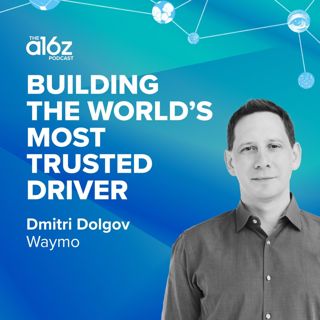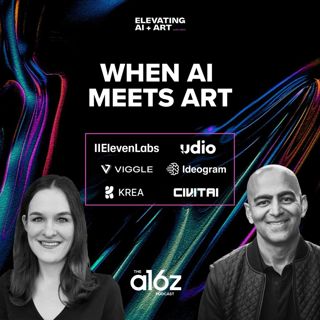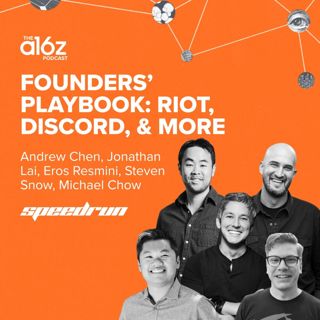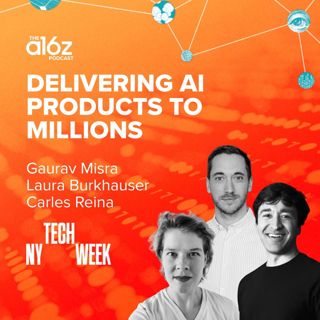
Building the World's Most Trusted Driver
Waymo's autonomous vehicles have driven over 20 million miles on public roads and billions more in simulation.In this episode, a16z General Partner David George sits down with Dmitri Dolgov, CTO at Waymo, to discuss the development of self-driving technology. Dmitri provides technical insights into the evolution of hardware and software, the impact of generative AI, and the safety standards that guide Waymo's innovations.This footage is from AI Revolution, an event that a16z recently hosted in San Francisco. Watch the full event here: a16z.com/dmitri-dolgov-waymo-ai Resources: Find Dmitri on Twitter: https://x.com/dmitri_dolgovFind David George on Twitter: https://x.com/DavidGeorge83Learn more about Waymo: https://waymo.com/ Stay Updated: Let us know what you think: https://ratethispodcast.com/a16zFind a16z on Twitter: https://twitter.com/a16zFind a16z on LinkedIn: https://www.linkedin.com/company/a16zSubscribe on your favorite podcast app: https://a16z.simplecast.com/Follow our host: https://twitter.com/stephsmithioPlease note that the content here is for informational purposes only; should NOT be taken as legal, business, tax, or investment advice or be used to evaluate any investment or security; and is not directed at any investors or potential investors in any a16z fund. a16z and its affiliates may maintain investments in the companies discussed. For more details please see a16z.com/disclosures. Stay Updated:Find a16z on XFind a16z on LinkedInListen to the a16z Podcast on SpotifyListen to the a16z Podcast on Apple PodcastsFollow our host: https://twitter.com/eriktorenberg Please note that the content here is for informational purposes only; should NOT be taken as legal, business, tax, or investment advice or be used to evaluate any investment or security; and is not directed at any investors or potential investors in any a16z fund. a16z and its affiliates may maintain investments in the companies discussed. For more details please see a16z.com/disclosures. Hosted by Simplecast, an AdsWizz company. See pcm.adswizz.com for information about our collection and use of personal data for advertising.
5 Aug 202438min

From AI to Instant Replay: The Technology Behind the Olympics
The Olympics features over 11,000 athletes competing in 32 sports, attracting an audience of more than 10 million.In this episode, Charlie Ebersol, co-founder of the Alliance of American Football and Infinite Athlete, explores how new innovations like AI and bespoke broadcasting technologies are shaping the future of sports.Charlie also reflects on the storytelling legacy of his father, Dick Ebersol, a legendary sports producer who transformed how we experience the Olympics. We discuss the importance of making sports more accessible and engaging through technology that enhances, rather than distracts from, the human stories at the heart of the games.Whether you're a tech enthusiast or a sports fan, this episode offers a unique look at the convergence of these two worlds.Resources: Find Charlie on Twitter: https://x.com/CharlieEbersolLearn more more about Infinite Athlete: https://infiniteathlete.ai/Stay Updated: Let us know what you think: https://ratethispodcast.com/a16zFind a16z on Twitter: https://twitter.com/a16zFind a16z on LinkedIn: https://www.linkedin.com/company/a16zSubscribe on your favorite podcast app: https://a16z.simplecast.com/Follow our host: https://twitter.com/stephsmithioPlease note that the content here is for informational purposes only; should NOT be taken as legal, business, tax, or investment advice or be used to evaluate any investment or security; and is not directed at any investors or potential investors in any a16z fund. a16z and its affiliates may maintain investments in the companies discussed. For more details please see a16z.com/disclosures. Stay Updated:Find a16z on XFind a16z on LinkedInListen to the a16z Podcast on SpotifyListen to the a16z Podcast on Apple PodcastsFollow our host: https://twitter.com/eriktorenberg Please note that the content here is for informational purposes only; should NOT be taken as legal, business, tax, or investment advice or be used to evaluate any investment or security; and is not directed at any investors or potential investors in any a16z fund. a16z and its affiliates may maintain investments in the companies discussed. For more details please see a16z.com/disclosures. Hosted by Simplecast, an AdsWizz company. See pcm.adswizz.com for information about our collection and use of personal data for advertising.
3 Aug 202436min

When AI Meets Art
On June 27th, the a16z team headed to New York City for the first-ever AI Artist Retreat at their office. This event brought together the builders behind some of the most popular AI creative tools, along with 16 artists, filmmakers, and designers who are exploring the capabilities of AI in their work.In this episode, we hear from the innovators pushing the boundaries of AI creativity. Joined by Anish Acharya, General Partner, and Justine Moore, Partner on the Consumer team, we feature insights from:Ammaar Reshi - Head of Design, ElevenLabsJustin Maier - Cofounder & CEO, CivitaiMaxfield Hulker - Cofounder & COO, CivitaiDiego Rodriguez - Cofounder & CTO, KreaVictor Perez - Cofounder & CEO, KreaMohammad Norouzi - Cofounder & CEO, IdeogramHang Chu - Cofounder & CEO, ViggleConor Durkan - Cofounder, UdioThese leaders highlight the surprising commonalities between founders and artists, and the interdisciplinary nature of their work. The episode covers the origin stories behind these innovative tools, their viral moments, and their future visions. You'll also hear about the exciting potential for AI in various creative modalities, including image, video, music, 3D, and speech.Keep an eye out for more in our series highlighting the founders building groundbreaking foundation models and AI applications for video, audio, photography, animation, and more.Learn more and see videos on artists leveraging AI at: a16z.com/aiart Find Ammaar on Twitter: https://x.com/ammaarLearn more about ElevenLabs: https://elevenlabs.ioFind Justin on Twitter: https://x.com/justmaierFind Max on LinkedIn: https://www.linkedin.com/in/maxfield-hulker-5222aa230/Learn more about Civitai: https://civitai.comFind Diego on Twitter: https://x.com/asciidiego?lang=enFind Victor on Twitter: https://x.com/viccpoesLearn more about Krea: https://www.krea.ai/homeFind Mohammed on Twitter: https://x.com/mo_norouziLearn more about Ideogram: https://ideogram.ai/t/exploreFind Conor on Twitter: https://x.com/conormdurkanLearn more about Udio: https://www.udio.com/homeFind Hang on Twitter: https://x.com/chuhang1122Learn more about Viggle: https://viggle.ai/ Stay Updated: Let us know what you think: https://ratethispodcast.com/a16zFind a16z on Twitter: https://twitter.com/a16zFind a16z on LinkedIn: https://www.linkedin.com/company/a16zSubscribe on your favorite podcast app: https://a16z.simplecast.com/Follow our host: https://twitter.com/stephsmithioPlease note that the content here is for informational purposes only; should NOT be taken as legal, business, tax, or investment advice or be used to evaluate any investment or security; and is not directed at any investors or potential investors in any a16z fund. a16z and its affiliates may maintain investments in the companies discussed. For more details please see a16z.com/disclosures. Stay Updated:Find a16z on XFind a16z on LinkedInListen to the a16z Podcast on SpotifyListen to the a16z Podcast on Apple PodcastsFollow our host: https://twitter.com/eriktorenberg Please note that the content here is for informational purposes only; should NOT be taken as legal, business, tax, or investment advice or be used to evaluate any investment or security; and is not directed at any investors or potential investors in any a16z fund. a16z and its affiliates may maintain investments in the companies discussed. For more details please see a16z.com/disclosures. Hosted by Simplecast, an AdsWizz company. See pcm.adswizz.com for information about our collection and use of personal data for advertising.
30 Juli 202443min

Founders Playbook: Lessons from Riot, Discord, & More
Gaming is not just entertainment—it's a revolution reshaping our culture, technology, and economy. a16z’s Jonathan Lai and Andrew Chen dive into the current gaming renaissance and its future impact. Joining them are Michael Chow, CEO and Steven Snow, CPO of The Believer Company, and Eros Resmini, Founder and Managing Partner of The Mini Fund.They explore the intersection of tech, art, psychology, and design in gaming, discussing how startups can navigate intense competition, distribution challenges, and high production costs. With insights from these industry leaders, this episode covers the transformative potential of AI, the importance of player feedback, and strategies to stand out in a crowded market.Recorded during Speedrun, a16z’s extensive games accelerator, this episode offers a glimpse into the strategies and innovations driving the gaming industry forward. Resources: Find Steven on Twitter: https://twitter.com/StevenSnowFind Michael on LinkedIn: https://www.linkedin.com/in/believer-paladin/Find Eros on Twitter: https://twitter.com/erosresminiFind Jonathan on Twitter: https://twitter.com/TocelotFind Andrew on Twitter: https://twitter.com/andrewchenLearn more about Speedrun: https://a16z.com/games/speedrun/ Stay Updated: Let us know what you think: https://ratethispodcast.com/a16zFind a16z on Twitter: https://twitter.com/a16zFind a16z on LinkedIn: https://www.linkedin.com/company/a16zSubscribe on your favorite podcast app: https://a16z.simplecast.com/Follow our host: https://twitter.com/stephsmithioPlease note that the content here is for informational purposes only; should NOT be taken as legal, business, tax, or investment advice or be used to evaluate any investment or security; and is not directed at any investors or potential investors in any a16z fund. a16z and its affiliates may maintain investments in the companies discussed. For more details please see a16z.com/disclosures. Stay Updated:Find a16z on XFind a16z on LinkedInListen to the a16z Podcast on SpotifyListen to the a16z Podcast on Apple PodcastsFollow our host: https://twitter.com/eriktorenberg Please note that the content here is for informational purposes only; should NOT be taken as legal, business, tax, or investment advice or be used to evaluate any investment or security; and is not directed at any investors or potential investors in any a16z fund. a16z and its affiliates may maintain investments in the companies discussed. For more details please see a16z.com/disclosures. Hosted by Simplecast, an AdsWizz company. See pcm.adswizz.com for information about our collection and use of personal data for advertising.
25 Juli 202425min

Transitioning From Gymnast to Investor with Aly Raisman
Former gymnast and current investor Aly Raisman joins general partner Julie Yoo and investment partner Daisy Wolf of a16z Bio + Health.In this episode, Aly Raisman shares her quest for healthier living—physically, mentally, and financially—on her journey from gymnast to a business investor. Having transitioned from an intensely structured routine, Aly emphasizes the need for more open conversations about mental health and financial literacy. She speaks passionately about the gap in women’s health solutions and hopes to inspire entrepreneurs to create impactful businesses. Aly’s experiences as a patient, survivor, and global figure adds a unique dimension to her perspective as an investor. This candid conversation with Aly and Julie Yoo sheds light on Aly’s passion for more education within the investment space, offering invaluable insights for entrepreneurs, particularly in biotech and healthcare. Resources: Find Aly on Twitter: https://x.com/aly_raismanFind Julie on Twitter: https://x.com/julesyooFind Daisy on Twitter: https://x.com/daisydwolf Stay Updated: Let us know what you think: https://ratethispodcast.com/a16zFind a16z on Twitter: https://twitter.com/a16zFind a16z on LinkedIn: https://www.linkedin.com/company/a16zSubscribe on your favorite podcast app: https://a16z.simplecast.com/Follow our host: https://twitter.com/stephsmithioPlease note that the content here is for informational purposes only; should NOT be taken as legal, business, tax, or investment advice or be used to evaluate any investment or security; and is not directed at any investors or potential investors in any a16z fund. a16z and its affiliates may maintain investments in the companies discussed. For more details please see a16z.com/disclosures. Stay Updated:Find a16z on XFind a16z on LinkedInListen to the a16z Podcast on SpotifyListen to the a16z Podcast on Apple PodcastsFollow our host: https://twitter.com/eriktorenberg Please note that the content here is for informational purposes only; should NOT be taken as legal, business, tax, or investment advice or be used to evaluate any investment or security; and is not directed at any investors or potential investors in any a16z fund. a16z and its affiliates may maintain investments in the companies discussed. For more details please see a16z.com/disclosures. Hosted by Simplecast, an AdsWizz company. See pcm.adswizz.com for information about our collection and use of personal data for advertising.
17 Juli 202421min

Live at Tech Week: Delivering AI Products to Millions
Less than two years since the breakthrough of text-based AI, we now see incredible developments in multimodal AI models and their impact on millions of users.As part of New York Tech Week, we brought together a live audience and three leaders from standout companies delivering AI-driven products to millions. Gaurav Misra, Cofounder and CEO of Captions, Carles Reina, Chief Revenue Officer of ElevenLabs, and Laura Burkhauser, VP of Product at Descript discuss the challenges and opportunities of designing AI-driven products, solving real customer problems, and effective marketing.From the critical need for preventing AI misuse to ensuring international accessibility, they cover essential insights for the future of AI technology. Resources: Find Laura on Twitter: https://x.com/burkenstocksFind Carles on Twitter :https://twitter.com/carles_reinaFind Gaurav of Twitter: https://twitter.com/gmharhar Stay Updated: Let us know what you think: https://ratethispodcast.com/a16zFind a16z on Twitter: https://twitter.com/a16zFind a16z on LinkedIn: https://www.linkedin.com/company/a16zSubscribe on your favorite podcast app: https://a16z.simplecast.com/Follow our host: https://twitter.com/stephsmithioPlease note that the content here is for informational purposes only; should NOT be taken as legal, business, tax, or investment advice or be used to evaluate any investment or security; and is not directed at any investors or potential investors in any a16z fund. a16z and its affiliates may maintain investments in the companies discussed. For more details please see a16z.com/disclosures. Stay Updated:Find a16z on XFind a16z on LinkedInListen to the a16z Podcast on SpotifyListen to the a16z Podcast on Apple PodcastsFollow our host: https://twitter.com/eriktorenberg Please note that the content here is for informational purposes only; should NOT be taken as legal, business, tax, or investment advice or be used to evaluate any investment or security; and is not directed at any investors or potential investors in any a16z fund. a16z and its affiliates may maintain investments in the companies discussed. For more details please see a16z.com/disclosures. Hosted by Simplecast, an AdsWizz company. See pcm.adswizz.com for information about our collection and use of personal data for advertising.
12 Juli 202446min

Marc Andreessen on Building Netscape & the Birth of the Browser
"The Ben & Marc Show," featuring a16z co-founders Marc Andreessen and Ben Horowitz. In this special episode, Marc and Ben dive deep into the REAL story behind the creation of Netscape—a web browser co-created by Marc that revolutionized the internet and changed the world. As Ben notes at the top, until today, this story has never been fully told either in its entirety or accurately. In this one-on-one conversation, Marc and Ben discuss Marc's early life and how it shaped his journey into technology, the pivotal moments at the University of Illinois that led to the development of Mosaic (a renegade browser that Marc developed as an undergrad), and the fierce competition and legal battles that ensued as Netscape rose to prominence. Ben and Marc also reflect on the broader implications of Netscape's success, the importance of an open internet, and the lessons learned that still resonate in today's tech landscape (especially with AI). That and much more. Enjoy!Watch the FULL Episode on YouTune: https://youtu.be/8aTjA_bGZO4 Resources: Marc on X: https://twitter.com/pmarca Marc’s Substack: https://pmarca.substack.com/ Ben on X: https://twitter.com/bhorowitz Book mentioned on this episode: - “Expert Political Judgment” by Philip E. Tetlock https://bit.ly/45KzP6M TV Series mentioned on this episode: - “The Mandalorian” (Disney+) https://bit.ly/3W0Zyoq Stay Updated: Let us know what you think: https://ratethispodcast.com/a16zFind a16z on Twitter: https://twitter.com/a16zFind a16z on LinkedIn: https://www.linkedin.com/company/a16zSubscribe on your favorite podcast app: https://a16z.simplecast.com/Follow our host: https://twitter.com/stephsmithioPlease note that the content here is for informational purposes only; should NOT be taken as legal, business, tax, or investment advice or be used to evaluate any investment or security; and is not directed at any investors or potential investors in any a16z fund. a16z and its affiliates may maintain investments in the companies discussed. For more details please see a16z.com/disclosures. Stay Updated:Find a16z on XFind a16z on LinkedInListen to the a16z Podcast on SpotifyListen to the a16z Podcast on Apple PodcastsFollow our host: https://twitter.com/eriktorenberg Please note that the content here is for informational purposes only; should NOT be taken as legal, business, tax, or investment advice or be used to evaluate any investment or security; and is not directed at any investors or potential investors in any a16z fund. a16z and its affiliates may maintain investments in the companies discussed. For more details please see a16z.com/disclosures. Hosted by Simplecast, an AdsWizz company. See pcm.adswizz.com for information about our collection and use of personal data for advertising.
8 Juli 20241h 42min

The Art of Technology, The Technology of Art
We know that technology has changed art, and that artists have evolved with every new technology — it’s a tale as old as humanity, moving from cave paintings to computers. Underlying these movements are endless debates around inventing versus remixing; between commercialism and art; between mainstream canon and fringe art; whether we’re living in an artistic monoculture now (the answer may surprise you); and much much more. So in this new episode featuring Berlin-based contemporary artist Simon Denny -- in conversation with a16z crypto editor in chief Sonal Chokshi -- we discuss all of the above debates. We also cover how artists experimented with the emergence of new technology platforms like the web browser, the iPhone, Instagram and social media; to how generative art found its “native” medium on blockchains, why NFTs; and other art movements. Denny also thinks of entrepreneurial ideas -- from Peter Thiel's to Chris Dixon's Read Write Own -- as an "aesthetic"; and thinks of technology artifacts (like NSA sketches!) as art -- reflecting all of these in his works across various mediums and contexts. How has technology changed art, and more importantly, how have artists changed with technology? How does art change our place in the world, or span beyond space? It's about optimism, and seeing things anew... all this and more in this episode. Resources: Find Denny on Twitter: https://x.com/dennnnnnnnnyFind Sonal on Twitter: https://x.com/smc90 Stay Updated: Let us know what you think: https://ratethispodcast.com/a16zFind a16z on Twitter: https://twitter.com/a16zFind a16z on LinkedIn: https://www.linkedin.com/company/a16zSubscribe on your favorite podcast app: https://a16z.simplecast.com/Follow our host: https://twitter.com/stephsmithioPlease note that the content here is for informational purposes only; should NOT be taken as legal, business, tax, or investment advice or be used to evaluate any investment or security; and is not directed at any investors or potential investors in any a16z fund. a16z and its affiliates may maintain investments in the companies discussed. For more details please see a16z.com/disclosures. Stay Updated:Find a16z on XFind a16z on LinkedInListen to the a16z Podcast on SpotifyListen to the a16z Podcast on Apple PodcastsFollow our host: https://twitter.com/eriktorenberg Please note that the content here is for informational purposes only; should NOT be taken as legal, business, tax, or investment advice or be used to evaluate any investment or security; and is not directed at any investors or potential investors in any a16z fund. a16z and its affiliates may maintain investments in the companies discussed. For more details please see a16z.com/disclosures. Hosted by Simplecast, an AdsWizz company. See pcm.adswizz.com for information about our collection and use of personal data for advertising.
3 Juli 20241h 3min






















